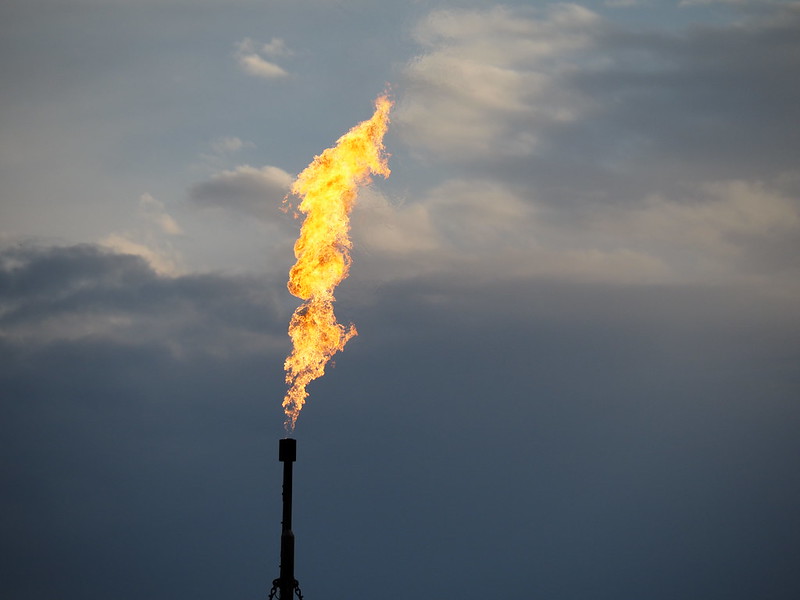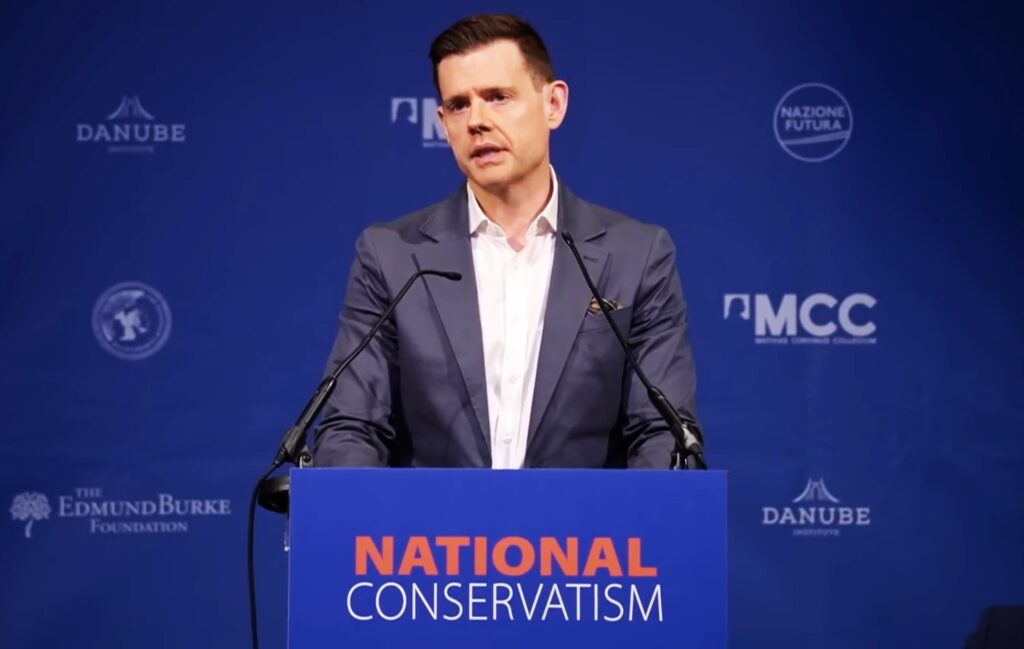The fossil fuel industry is ramping up efforts to weaken a key EU policy aimed at tackling the potent greenhouse gas methane, according to a new report by research group InfluenceMap.
Published today, the report highlights how oil and gas companies and lobby groups across the EU and U.S. are using a range of tactics to destabilise the EU’s methane regulation. The policy was adopted in August 2024, and includes new rules to reduce emissions in the energy, agriculture and waste sectors, and is due to be fully implemented by 2030.
The surge in industry lobbying highlighted by InfluenceMap coincides with the EU’s strategy to regulate the energy market, as it weans off Russian gas by 2027 and signs deals to import gas from the United States and other countries.
Subscribe to our newsletter
Stay up to date with DeSmog news and alerts
Under the new rules, oil, gas and coal companies will be required to measure, report and verify emissions – a process referred to as MRV – as well as meet specific conditions for detecting leaks and repairs (LDAR). They would also be banned from routine venting and flaring, including from imported fossil fuels.
The regulation could reduce methane emissions associated with oil and gas imports to the EU by at least 64 percent by 2031, according to a 2023 report by environmental organisation Clean Air Task Force (CAFT), based in Boston, Massachusetts.
“Over the past six to nine months we’ve seen a concerted lobbying push,” said Georgia Oddie, an analyst at InfluenceMap. “We’re seeing a significant amount of pressure on policymakers from the [fossil fuel] industry, led by a couple of main industry associations.”
Cutting methane emissions has widely been characterised as an “emergency break” for climate action, Oddie added.
“Gas use has to be paired with emissions reduction techniques and it’s crucial for industries in hard to abate sectors that rely on gas that the supply chain is regulated.
“For industry to push for a more pragmatic approach suggests leaving the door open to effectively reduce the stringency of the rule.”
The ‘Simplification’ Mantra
Industry’s calls to relax reporting requirements come as lobby groups seek to capitalise on the European Commission’s new mandate and strategy of “competitiveness”, “security” and “simplification”.
The Commission is in the process of amending multiple sustainability reporting laws through a collection of policy proposals known as the “omnibus package”. While the methane regulation is not yet included in this, InfluenceMap’s research suggests calls to “simplify” the policy show how industry groups are pushing to include it in order to weaken climate action.
For example, in a position statement from February, the European branch of the International Association of Oil and Gas Producers (IOGP) proposed adding the methane regulation within the scope of the omnibus “as soon as possible”.
In the same month, the European managing director of IOGP told Politico that the regulation “jeopardizes” a deal to secure U.S. liquefied natural gas (LNG) and avoid U.S. President Donald Trump’s tariffs, adding that they were “doing everything to reopen” the legislation.
Weeks later, industry group Eurogas raised its concerns in a position paper over the regulation’s impact on EU “competitiveness” as well as “security of supply”.
In April, in a joint letter addressed to EU Commission officials, 19 U.S. and EU energy groups highlighted the “significant challenges” the regulation creates for the “security of the EU’s gas supply, particularly as the EU seeks to ensure affordability and […] replace Russian gas imports.” Signatories included a roster of oil and gas multinationals: BP, ConocoPhillips, Engie, Eni, Equinor, Naturgy, Repsol, and Uniper, as well as lobby group Eurogas.
A 2025 report by energy think tank Ember described fossil-importing nations as “frogs in boiling water”. While oil and gas companies claim fossil fuels are essential for “energy security”, research has shown that diversifying to abundant renewables such as wind and solar, as well as using heat pumps and electric vehicles, will help provide energy independence and, in turn, strengthen security.
A number of member states have also pushed to weaken the legislation. The Polish Council Presidency is proposing to “simplify” the methane regulation, following in the footsteps of initiatives by Romania, Slovakia and Hungary, which are due to be presented when EU member state energy ministers convene on June 16 at the Energy Council.
Environmental organizations and climate advocates are calling for member states to “defend” and protect the “integrity and impact” of the regulation, and to commit to the requirements, rather than push for the legislation to be reopened.
Experts say member states are most concerned about enforcement and fines for those not following the regulation’s requirements.
“Many of the concerns we’ve seen leveled against the regulation are recycled arguments that we already have answers to,” Brandon Locke, senior Europe policy manager for methane pollution prevention at Clean Air Task Force, told DeSmog.
“I would say the Commission seems very steadfast in trying to maintain the climate integrity of the legislation despite there being other stakeholders, even other member states, that may have an interest in weakening it,” he added.
“Taking a step to reopen the legislation without any real justification for it, I think that would be an unwise move, […] it would be like destroying a bridge that they spent a lot of time building.”
The Commission has not yet responded to DeSmog’s requests for comment.
Transatlantic Pressure
The push for “simplification” has also come from the U.S. amid political pressure on the EU to boost oil and gas imports, in particular liquefied natural gas (LNG).
The gas, which is shrunk by a factor of 600 when it is cooled into liquid, so it can be shipped across the world, can cause up to ten times the carbon emissions compared to pipeline gas, research has found, mainly due to the methane leaks associated with transportation. Methane is 84 times more potent than carbon dioxide over a 20-year period, and cutting emissions from oil, gas and coal by 75 percent by the end of this decade is vital to limit global warming to 1.5C.
Industry groups in the U.S., in particular, have been lobbying at the EU level to weaken measures that would ensure fossil fuel imports are meeting Europe’s methane requirements for the sector.
In a May 2024 correspondence with EU Commissioner Maroš Šefčovič, LNG company Cheniere Energy defined the MRV requirements for importers as “unworkable” and said that alignment between the EU and the U.S. was “critical,” the InfluenceMap research showed.
In November, Reuters reported on a letter to EU officials signed by U.S. trade groups, including the Chamber of Commerce and American Petroleum Institute (API), signaling concerns that the requirements might prevent the EU from importing U.S. fossil fuels, thereby impacting the bloc’s “security of supply”. In a March 2025 letter to the U.S. Trade Representative, the U.S. Chamber reiterated these concerns.
“Since the Trump administration officially started work in January, we have heard many [actors] from the U.S. oil and gas industry being quite vocal at the EU level, and calling to the fact that the methane requirements on imports would be a problem to conclude long-term LNG import contracts,” said Esther Bollendorff, senior gas policy coordinator at CAN.
“For industry to push for a more pragmatic approach suggests leaving the door open to effectively reduce the stringency of the rule,” added InfluenceMap’s Oddie.
Energy Security Concerns
The report describes the industry’s lobbying efforts as a “two-pronged” approach – pushing for weakened regulation on methane on the one hand, while raising concerns around energy security on the other.
Coordinated efforts by the fossil fuel industry exploit concerns around energy security in order to lock-in oil and gas expansion, according to additional InfluenceMap research shared with DeSmog.
In Europe, Eurogas, IOGP, EQT Corporation and Spanish oil company Repsol have pushed for energy security, while U.S. and Canadian entities have made use of the narrative to emphasise the importance of North American LNG imports for EU energy security.
The findings mirror a 2023 DeSmog investigation showing an increase in calls for energy security by European gas lobbies after Russia’s full-scale invasion of Ukraine, while pushing for new gas deals and infrastructure in the wake of the war.
Experts also say that reducing methane can, in fact, improve energy security for the sector, and that the adopted regulation does not present a risk to the EU’s energy security, according to an assessment by CAFT.
“The methane regulation is a very important piece of the puzzle on the climate and energy side,” added Bollendorff from environmental group Climate Action Network.
“That’s why we see working on methane and reducing methane leakages that are happening across the supply chain, but mainly at the production stage, as a very important measure, alongside phasing out fossil gas by 2035.”
Subscribe to our newsletter
Stay up to date with DeSmog news and alerts






